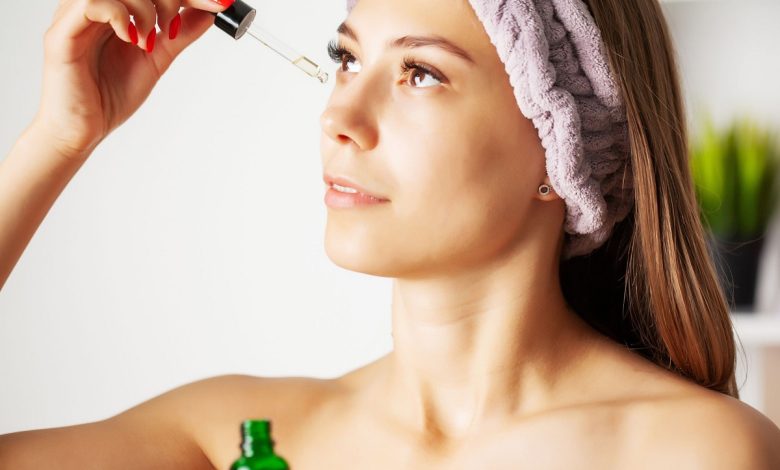Best Vitamins For Skin: From Vitamin D To Vitamin K

Best Vitamins For Skin: Skin care is an essential part of skin care routine. Because the skin is the largest organ of the human body.
The first thing that most of dermatologists recommend to people to keep their skin healthy is to limit their exposure to the sun’s harmful ultraviolet (UV) rays and use a protective sunscreen when they exposed to sunlight.
Best Vitamins For Skin, Of course, exposure to sunlight is not so bad. Just 10 to 15 minutes of sun exposure a day helps produce vitamin D throughout the skin.
In general, if we want to answer the question of what vitamins are necessary for facial skin care and health, is like; Vitamin D along with Vitamin C, Vitamin E and Vitamin K are the best vitamins needed for human skin health.
Ensuring that you get enough vitamins can keep your skin healthy and young. Continuity in receiving these substances can help in reducing things like skin darkening, redness, wrinkles, uneven lesions and excessive dryness. Essential skin vitamins are available in dietary supplement form, but they are also found in skin care products. In the following, explanations are provided regarding the required vitamins and minerals.
In the following audio file, you can listen to a summary of essential vitamins for facial skin care and health:
Best Vitamins For Skin
1. Vitamin D

Vitamin D is often made when sunlight is absorbed by human skin. When this happens, cholesterol is converted to vitamin D. Vitamin D is then absorbed by a person’s liver and kidneys and transported throughout the body to help create healthy cells. Also, vitamin D plays an important role in skin color and may help in the treatment of psoriasis.
Calcitriol is a synthetic form of vitamin D that humans produce naturally. Topical cream containing calcitriol has been effective in treating people with psoriasis.
Many available studies show that the use of calcitriol reduces inflammation and skin irritation in people with psoriasis and causes few side effects. Daily intake of 600 to 1000 units of vitamin D per day is recommended for skin and body health as well as increasing the strength of the immune system. People who are pregnant or over 70 may need more of this vitamin.
Vitamin D intake can be increased by observing the following:
Exposure to sunlight for 10 minutes a day (of course, in the case of people who have a history of acute or chronic skin diseases such as skin cancer, they should consult their doctor first)
Eating foods fortified with vitamin D such as breakfast cereals, some yogurts
Eating foods that naturally contain vitamin D, such as salmon, tuna, cod, and liver
Best Vitamins For Skin
2. Vitamin A
Vitamin A is a natural vitamin that can affect skin health in many ways, including strengthening skin collagen, reducing pigmentation, regulating oil (sebum) production, and reducing redness or inflammation. Continuous use of skin care products containing vitamin A can remove skin wrinkles and even out skin tone.
To reap the benefits of vitamin A, use a retin-based skin care product, such as retinol or retinoid. It is also recommended to consume foods rich in vitamin A such as carrots, sweet potatoes, kale, spinach and eggs.
Best Vitamins For Skin
3. Vitamin C

Vitamin C is found in high levels in the epidermis (the outer layer of the skin) as well as the dermis (the inner layer of the skin). The anti-cancer properties (antioxidant) and the role of vitamin C in the production of collagen help to maintain the health of the skin.
This is why vitamin C is one of the main ingredients used in many anti-aging skin care products. Taking vitamin C orally can increase the effectiveness of sunscreens that are applied to protect the skin from the sun’s harmful UV rays, and it does so by reducing cellular damage and helping the body’s wound healing process. Vitamin C can also help fight the signs of aging due to its vital role in the body’s natural collagen synthesis.
This vitamin helps in healing damaged skin and in some cases reduces the appearance of wrinkles. Adequate intake of vitamin C can also help repair and prevent dry skin. Due to the prevalence of vitamin C in over-the-counter products, dietary supplements, and foods that one consumes, deficiency of this nutrient is rare. The recommended amount of vitamin C is 1000 mg per day.
Recommendations for vitamin C consumption
People who do not get enough vitamin C in their diet can use the following:
Use more citrus foods such as oranges, tangerines, lemons and kiwis.
Use other vegetable sources of vitamin C such as strawberries, broccoli and spinach.
According to the doctor’s recommendation, receive appropriate food supplements.
Best Vitamins For Skin
4. Vitamin E
Vitamin E, like vitamin C, is an antioxidant. Its main function in skin care is to protect against sun damage. Vitamin E absorbs the sun’s harmful UV light when applied to the skin and can also help prevent dark spots and wrinkles.
Normally, the body produces vitamin E through sebum, which is an oily substance that comes out of the skin’s pores. In the right balance, sebum helps maintain the condition of the skin and prevents it from drying out. If a person has dry skin, vitamin E can probably help deal with the lack of sebum. Vitamin E also helps treat skin inflammation.
While vitamin E is found in many skin care products, the problem is that exposure to sunlight minimizes its effects. Getting enough vitamin E in the diet is preferable to taking supplements. Most adults need about 15 milligrams of vitamin E per day.
How to get vitamin E in the diet
You can increase the consumption of vitamin E by observing the following:
Eat more nuts and seeds such as almonds, hazelnuts and sunflower seeds
Taking a separate multivitamin or vitamin E supplement as prescribed by the doctor
Using topical products that contain both vitamin E and C (which can be more effective at sun protection than products that only contain one of the two).
Best Vitamins For Skin
5. Vitamin K

Vitamin K is essential for helping the body’s blood clotting process, which helps the body heal wounds, bruises, and areas affected by surgery. The basic functions of vitamin K are also thought to help with some skin conditions such as arachnoid meningiomas (spider veins), scars, dark spots, dark circles under the eyes.
Vitamin K can be found in many different topical skin creams and can help treat a variety of skin conditions. Doctors often use creams containing vitamin K on patients who have recently undergone surgery to help reduce swelling and bruising. This may help speed up skin healing. However, research on the effects of vitamin K on the skin is more limited than that of vitamins E and C.
Adults need between 90 and 120 micrograms per day. By consuming foods such as spinach, lettuce, cabbage, green beans, you can increase the intake of vitamin K.
Also Read:
Pregnancy Skin Care Routine: Skin Care Routine During Pregnancy
Lip Care: Causes Of Dry Lips And Ways To Deal With It
The 6 Best Home Brightening And Whitening Face Masks
Skincare After Shaving: Steps You Should Observe After Shaving




